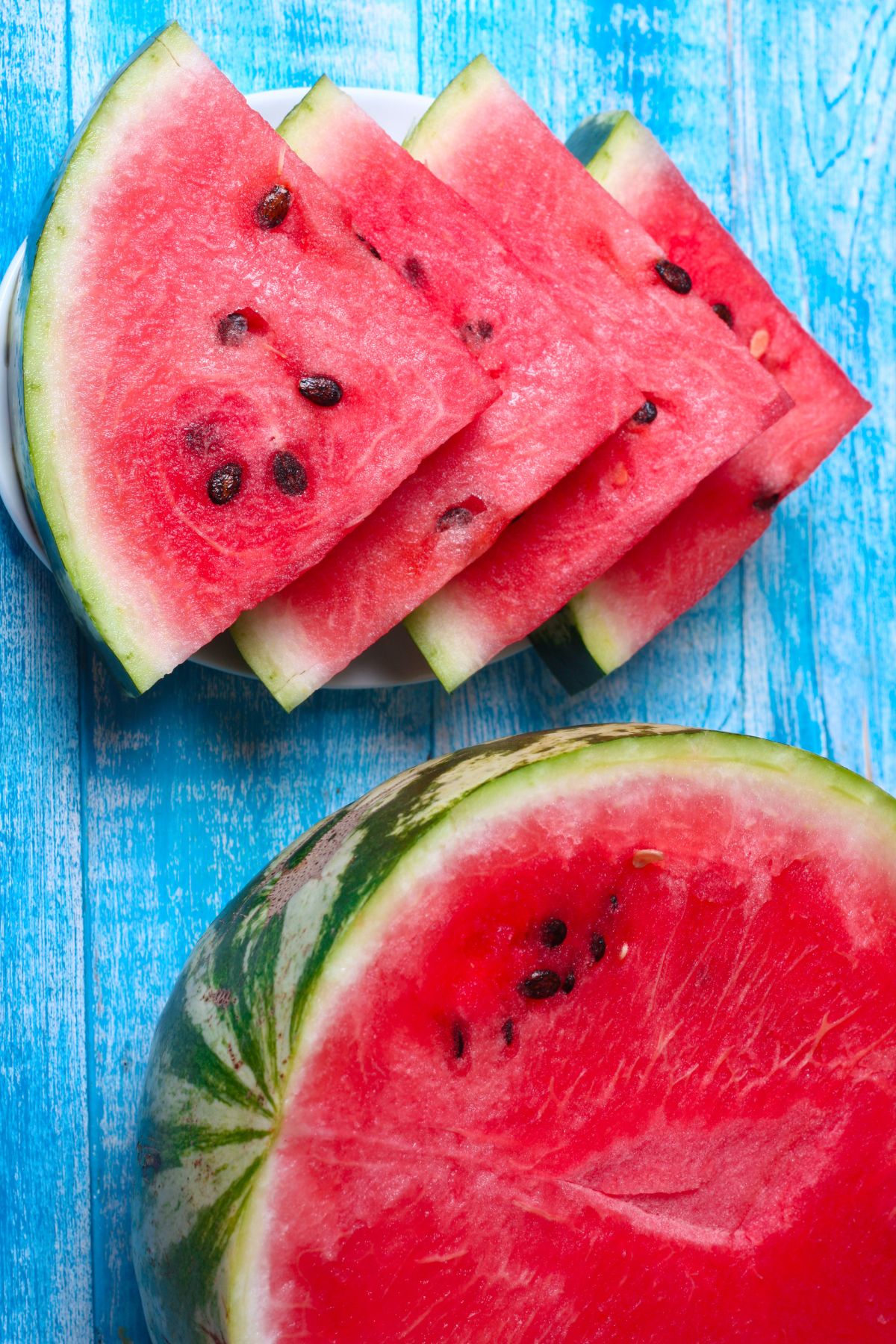Is watermelon low FODMAP? The purpose of this blog post is to dive deep into the relationship between watermelon and the low FODMAP diet, shedding light on how this delicious fruit fits into the dietary plans of those with Irritable Bowel Syndrome (IBS) and similar gastrointestinal disorders.

Learn about FODMAP content of foods like grapes, pineapple, green beans, beets, mushrooms, and coffee.
Table of Contents
At the heart of many digestive health discussions are FODMAPs, a group of small carbohydrate molecules found in certain foods. The acronym stands for fermentable oligosaccharides, disaccharides, monosaccharides, and polyols. These are carbohydrates that the digestive system may have a hard time absorbing, and they can be a source of discomfort for individuals with IBS and similar gastrointestinal disorders.
For those navigating these digestive challenges, understanding FODMAPs is crucial. When these carbohydrates are poorly absorbed in the small intestine, they travel to the large intestine, where they are fermented by bacteria, producing gas. This process can lead to digestive discomfort, including bloating, gas, stomach pain, constipation, and diarrhea—common symptoms of IBS.
Researchers at Monash University developed the low-FODMAP diet to lessen these symptoms. It involves a temporary reduction of high-FODMAP foods, followed by a strategic reintroduction phase to identify personal trigger foods. This diet aims to provide relief by minimizing the amount of fermentable carbohydrates consumed, thereby easing digestive symptoms and promoting a healthy digestive system.
In essence, following a low-FODMAP diet doesn’t mean you have to give up on flavor or variety. Instead, it’s about making informed choices that keep your gut happy, allowing you to enjoy a wide range of fruits, vegetables, grains, and proteins that meet your individual nutritional needs without aggravating your digestive system.
Is Watermelon Low FODMAP?
Navigating the waters of FODMAPs can be tricky, especially when it comes to fruits like watermelon, known for its sweetness and hydrating properties. So, is watermelon low-FODMAP? The answer requires a bit of nuance.
Watermelon does contain FODMAPs, specifically fructose, in amounts that vary depending on the serving size. According to research by Monash University, small servings of watermelon can fit into a low-FODMAP diet without causing significant digestive symptoms for most individuals with IBS. However, due to its fructose content, watermelon is generally considered high in FODMAP content, and larger servings may potentially trigger symptoms in sensitive individuals.
Watermelon does contain FODMAPs, specifically fructose, in amounts that vary depending on the serving size.
FODMAPs present in foods include fructose (a simple sugar found in many fruits), lactose (found in dairy), mannitol and sorbitol (sugar alcohols found in some fruits and vegetables), as well as GOS and fructans (found in legumes and wheat products). Watermelon’s main FODMAP is fructose, and it’s the balance between glucose and fructose that determines its FODMAP status.
A small serving of 1.5 tablespoons or 15 grams of watermelon can fit into a low-FODMAP diet without causing significant digestive symptoms for most individuals with IBS.
For those following a low-FODMAP diet, the key to enjoying watermelon is moderation. A serving size of about 15 grams (or 1.5 tablespoons of diced watermelon) is considered low in FODMAPs and should be tolerable for most individuals with IBS. Eating watermelon in excess, however, can lead to an intake of fructose that exceeds the individual tolerance levels, potentially resulting in digestive discomfort.
Is Watermelon Juice Low FODMAP?
Watermelon juice isn’t typically low in FODMAPs. When you juice watermelon, it increases the amount of sugars, like fructose, which is a sugar that’s high in FODMAPs. So, people who have a hard time with FODMAPs might find watermelon juice to be an issue.

Are Watermelon Seeds Low FODMAP?
Specific research on the FODMAP content of watermelon seeds by institutions like Monash University has yet to be conducted, with existing studies focusing solely on seedless watermelon varieties.
Given that many seeds are considered to be low in FODMAPs, those adhering to a low-FODMAP diet are advised to exercise caution and await further scientific findings in this area. Should you decide to reintroduce watermelon seeds into your diet after completing the initial restrictive phase, doing so gradually will help you determine your personal tolerance level and ensure digestive comfort.
Health Benefits of Watermelon
Watermelon isn’t just a refreshing fruit; it’s a nutritional powerhouse packed with essential nutrients that offer a myriad of health benefits. Here are some key reasons why incorporating watermelon into your diet is beneficial:
- Hydration: Watermelon is made up of about 92% water, making it an excellent choice for staying hydrated. Proper hydration is essential for a healthy digestive system, helping to maintain regular bowel movements and prevent constipation.
- Rich in Vitamins and Minerals: Watermelon provides significant amounts of vitamins A, C, and B6, along with potassium and magnesium. These nutrients support overall health, including the immune system, heart health, and muscle function.
- Antioxidant Properties: The vibrant red flesh of watermelon is due to lycopene, an antioxidant known for its potential to reduce oxidative stress and inflammation. For individuals with IBS, reducing inflammation can be beneficial in managing digestive symptoms.
- Low Calorie and Nutrient-Dense: As a delicious fruit that’s low in calories yet high in nutrients, watermelon can fit into a weight management plan while providing essential nutrients without overwhelming the digestive system.
- Digestive Health: Watermelon’s high water content and dietary fiber can support digestive health by promoting regularity and helping to prevent constipation, a common concern for those with sensitive digestive systems.
Incorporating watermelon into your diet not only adds a sweet, delicious fruit to your meals but also contributes to a balanced, nutrient-rich diet that supports your digestive health and overall well-being.
Exploring the Digestive Effects of Watermelon
Understanding how watermelon impacts the digestive system is crucial for those with IBS and following a low FODMAP diet. Despite being a low-FODMAP fruit in small quantities, watermelon’s effects on digestion can vary among individuals due to its fructose content and high water content.
For many, watermelon can be a gentle, hydrating choice that supports digestive health. Its high water content helps promote hydration, which is vital for a smooth digestive process, and can aid in preventing constipation, a common concern in IBS management. The presence of a small amount of fiber in watermelon also contributes to regular bowel movements, helping to maintain a healthy digestive system.
However, due to the fructose content in watermelon, some individuals might experience FODMAP-related symptoms if they consume more than the recommended serving size. Symptoms such as bloating, gas, and abdominal discomfort can occur when the amount of fructose overwhelms the individual’s absorption capacity. This is why moderation is key, and paying attention to individual tolerance levels is essential.
Moreover, it’s important to consider the overall context of your diet when consuming watermelon. Pairing watermelon with other low FODMAP foods can help balance the meal and reduce the risk of digestive discomfort. For instance, eating watermelon as part of a meal with adequate protein and fiber can help slow the absorption of fructose and mitigate potential digestive issues.

Incorporating Watermelon into a Low FODMAP Diet
Incorporating watermelon into your low-FODMAP diet can be a delightful way to enjoy the refreshing and nutritious qualities of this juicy summer fruit without compromising your digestive health. Here are some creative ways, recipes, and meal ideas that you can consider:
- Watermelon Salad: Combine low-FODMAP greens like arugula and celery with diced watermelon, lactose-free feta cheese, and a sprinkle of chopped almonds. Dress lightly with olive oil and lemon juice for a refreshing summer salad.
- Watermelon Smoothie: Blend a small portion of watermelon with low-FODMAP fruits like strawberries or blueberries, a dash of ginger, and some ice for a hydrating drink. Keep portions small to manage fructose intake.
- Chilled Watermelon Soup: Puree watermelon with a touch of lime juice and mint for a cold soup, perfect for hot days. Serve in small cups to keep it low-FODMAP-friendly.
- Grilled Watermelon Steaks: Slice watermelon into thick steaks, grill for a few minutes on each side, and season with a pinch of salt and a drizzle of balsamic reduction. Pair with grilled chicken or tofu for a balanced meal.
- Watermelon Ice Pops: Puree watermelon and pour into ice pop molds for a refreshing treat. You can add a few low-FODMAP berries for added flavor and visual appeal.
- Watermelon Salsa: Dice watermelon, cucumber, and green onions to make a refreshing salsa. Serve with grilled fish or chicken for a light and satisfying meal.
Tips for Eating Watermelon With IBS
Here are a few tips to keep in mind when adding watermelon to your diet if you have IBS:
- Watch Portion Sizes: Remember that while watermelon is low in FODMAP in servings of 15 grams, larger portions may lead to digestive discomfort.
- Monitor Your Body’s Response: Individual tolerance levels vary, so it’s crucial to pay attention to how your body reacts after consuming watermelon and adjust accordingly.
- Balance Your Meals: Incorporate watermelon into a balanced diet that includes a variety of low-FODMAP proteins, vegetables, and grains to ensure you’re getting a broad spectrum of nutrients.
- Stay Hydrated: Besides the hydrating properties of watermelon, ensure you’re drinking plenty of water throughout the day to support digestive health.
By creatively incorporating watermelon into your low-FODMAP diet, you can enjoy its sweet, refreshing taste and health benefits without worrying about triggering IBS symptoms. With careful planning and attention to how your body responds, watermelon can be a delightful part of your dietary repertoire, offering hydration, essential nutrients, and a burst of flavor to your meals.
Navigating Food Labels: Identifying Low FODMAP Watermelon Products
When incorporating watermelon into a low FODMAP diet, it’s essential to be savvy about reading food labels, especially for watermelon products like juices, snacks, and flavored foods. Here are some tips to help you identify low FODMAP options and steer clear of hidden FODMAPs in watermelon products.
- Look for Pure Watermelon Products: Choose products that list watermelon as the sole or primary ingredient without added sugars or other high-FODMAP fruits. Pure watermelon is more likely to be low in FODMAP in small quantities.
- Check for Added Sugars: Many watermelon-flavored products contain added sugars, including high-FODMAP sweeteners like high-fructose corn syrup. Opt for items with natural sweeteners or no added sugar to stay within low FODMAP limits.
- Beware of Artificial Flavors and Additives: Some watermelon-flavored products may contain artificial flavors or additives that can upset sensitive stomachs. Whenever possible, choose natural or minimally processed options to minimize the risk of digestive discomfort.
- Watch Out for Portion Sizes: Even if a watermelon product has low FODMAP at a small serving size, consuming it in larger quantities can increase the overall FODMAP load, potentially leading to symptoms. Always consider the serving size in relation to your personal tolerance levels.
- Understand FODMAP Stacking: Consuming multiple low-FODMAP foods at once can lead to a phenomenon known as FODMAP stacking, where the combined intake exceeds low FODMAP thresholds. Be mindful of consuming watermelon products alongside other FODMAPs within the same meal or snack.

Key Takeaways
To wrap up our exploration of watermelon within a low-FODMAP diet, let’s recap the essential points to remember:
- Watermelon in Moderation: Watermelon is high in FODMAPs, so portion control is key to managing your symptoms.
- Individual Tolerance: Keep in mind that individual tolerance levels vary. Some people may handle slightly larger servings of watermelon without issues, while others might need to be more cautious.
- Watermelon Juice Caution: While refreshing, watermelon juice concentrates the fruit’s sugars, making it higher in FODMAPs. Small amounts might fit into your diet, but always be mindful of your personal tolerance.
- Watermelon Seeds: Currently, there is no research to support the assertion that watermelon seeds are low in FODMAP.
- Nutritional Benefits: Watermelon offers hydration, vitamins, minerals, and antioxidants, contributing to overall health and digestive well-being.
- Read Labels Carefully: When choosing watermelon products, especially juices or flavored items, read labels for added sugars and high-FODMAP ingredients. Opt for products with minimal processing and natural ingredients.
- Listen to Your Body: Ultimately, the best guide for incorporating watermelon into your diet is your own body. Monitor how you feel after eating watermelon or watermelon products and adjust your intake accordingly.
- Are Potatoes Low FODMAP? Adding Spuds Wisely For IBS - March 15, 2024
- Is Watermelon Low FODMAP? Tips for Eating With IBS - March 13, 2024
- Are Blueberries Low FODMAP? Discover The Digestive Benefits - March 12, 2024
